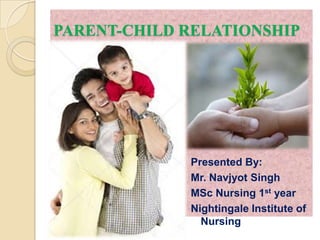
Parents child relationship
- 1. PARENT-CHILD RELATIONSHIP Presented By: Mr. Navjyot Singh MSc Nursing 1st year Nightingale Institute of Nursing
- 2. INTRODUCTION: Parents are usually the first people a child learns to trust. Parents and families are the most important people in children’s lives. The many different relationships people form over the course of the life span, the relationship between parent and child is among the most important.
- 3. Definition: The parent-child relationship consists of a combination of behaviors, feelings, and expectations that are unique to a particular parent and a particular child. The relationship involves the full extent of a child's development.
- 4. Types of Parent Child Relationship There are mainly four categories of parent child relationship. Secure relationships. Avoidant relationships. Ambivalent relationships. Disorganized relationships.
- 5. 1. Secure relationships: - This is the strongest type of attachment. A child in this category feels he can depend on his parent or provider. He knows that person will be there when he needs support. 2. Avoidant relationships: - This is one category of attachment that is not secure. Avoidant children have learned that depending on parents won’t get them that secure feeling they want, so child learn to take care of themselves. Avoidant children may seem too independent and usually do not build strong relationships.
- 6. 3. Ambivalent relationships: - Ambivalence is another way a child may be insecurely attached to his parents. Child notice what behavior got their parents’ attention in the past and use it over and over. Children are always looking for that feeling of security.
- 7. 4. Disorganized relationships: - Disorganized children don’t know what to expect from their parents. Children with relationships learns to predict how his parent will react, whether it is positive or negative. Child also learns that doing certain things will make their parents do certain things.
- 8. PARENTING Parenting- It is the process of promoting and supporting the physical, emotional, social, and intellectual development of a child from infancy to adulthood. Parenting styles- It means a psychological construct representing standard strategies that parents use in their child rearing.
- 9. Parenting styles:- • Authoritarian 1. • Authoritative 2. • Permissive/Indulgent 3. • Detached 4.
- 10. 1. Authoritarian Parents: - The parent is demanding but not responsive.Authoritarian parents are rigid in their rules; they expect absolute obedience from the child without any questioning. Authoritarian parents are strict disciplinarians. 2. Authoritative: - Authoritative parents show respect for the opinions of their children. Authoritative parents are both responsive and demanding; they are firm, but they discipline with love and affection, rather than power.
- 11. 3. Permissive/Indulgent: - Permissive (indulgent) parents have little or no control over the behavior of their children. Indulgent parents are responsive but not especially demanding. They have few expectations of their children and impose little or inconsistent discipline. There are empty threats of punishment without setting limits. Role reversal occurs. 4. Detached: - Detached parents are neither responsive nor demanding. They may be careless or unaware of the child's needs for affection and discipline.
- 12. Characteristics of a Healthy Parent-Child Relationship Flexible/Adaptable Connected Appropriateboundaries Open Communication Discipline
- 13. 1.Flexible/Adaptable: - Good parents must be flexible and adaptable. They have ability to recognize and accommodate the child’s need. Help the child by giving clear directions, offering opportunities to choose and negotiate. 2.Connected: - Parents should have ability to differentiate the child’s worth from his or her behavior, and create a reward-oriented environment in which consequences are positive outcome. Respond to a child’s problems or feelings with
- 14. 3. Appropriate boundaries: - The parent- child relationship includes various boundaries. Healthy boundaries consider that what the parent and the child want in a positive way to find a mutually agreeable solution or limit. 4. Open Communication: -- The way the parent and child communicate sets the tone for the relationship. The healthy parent- child relationships use positive communication that separates the child's worth from behavior.
- 15. 5. Discipline: - For healthy parent child relationship discipline also very important aspect. To finding the solution of conflicts and behavioral problem helps to encourage the strong relation rather than punishing children in an attempt to teach.
- 16. Factors Influencing Parent-Child Relationship Family structure Social and community support Relationship History Emotional system Temperament Parenting Experiences Intellectual Capacity Education (formal and informal) Cultural context and experiences
- 17. Methods to Improve Child - Parent Relationships 1. Play games with Child. 2. Casual conversation. 3. Bring the child to new places. 4. Rewarding
- 18. SUMMARY The parent-child relationship consists of a combination of behaviors, feelings, and expectations that are unique to a particular parent and a particular child. Whereas Parenting is the process of promoting and supporting the physical, emotional, social, and intellectual development of a child which is having different styles child rearing. There are many factors which influence the relationship but parent child relationship can be maintained by various ways as appreciating the child, taking him to new places and casual conversation between parents and children.
- 19. BIBLIOGRAPHY Dorothy R. Marlow, Textbook of Pediatric nursing, Saunders publisher, 6th edition, page no. 31-39 Marilyn J Hockenberry, Essential of pediatric nursing, Mosby publisher, 7th edition, page no.29-48 http://www.extension.purdue.edu/providerparent/ Family-Child%20Relationships/DifferentTypesP- C.htm http://www.answers.com/topic/parent-child- relationships#ixzz2A1arMTSO http://ezinearticles.com/?Methods-to-Improve- Child---Parent-Relationships&id=1703081 http://www.vindadravid.com/tag/parent-child- relationship/
